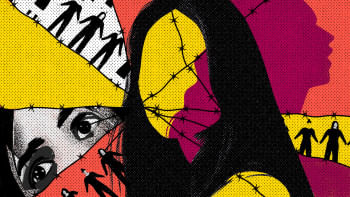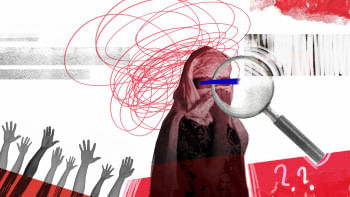Money and power should never undermine justice

There are stories that make you sick to your stomach, and then there are stories that remind you how little has actually changed in the country regarding women's safety, no matter who holds the reins of power.
The 2024 Subarnachar case is both.
Back in February last year, a woman and her 12-year-old daughter were gang-raped in their own home in Noakhali's Subarnachar upazila. Yes, a child—but I suppose by now, it comes as no surprise.
But instead of seeing the accused behind bars, we are now seeing the survivors being forced to leave their home amid death threats. They have been forced to sell everything and run—not because they are guilty, but because they dared to demand justice.
The prime accused is Abul Khair Munshi, a known local Awami League leader, who was arrested after the incident. However, he was released on bail in November and is now roaming free. Even though his party has been ousted, he roams confident enough to threaten his victims, confident enough to walk up to a survivor's face on court premises and threaten to kill them if they don't withdraw the case. And even after the survivor filed a general diary (GD) with Char Jabbar Police Station on January 19, the threats have not stopped.
The officer-in-charge of the station confirmed the filing of the GD. He also said that "primary investigation found the allegation to be true." Yet, after the last hearing on June 24, Munshi told the victim he has money, so the court verdict will go in his favour.
Think about what that means.
A man accused of gang-raping a woman and her minor child has so little fear of consequences that he can openly brag about buying justice. And why shouldn't he? The way our legal system works, money has often spoken louder than the law, and political connections have shielded even the most disgraceful crimes.
But here is the brutal truth no one seems ready to face: no party should ever matter when it comes to justice.
The Awami League's fall was supposed to symbolise a new era—one where ordinary people could hope for justice, where survivors would be heard. And yet here we are.
It seems that one member of the party still clings to enough influence to intimidate survivors, enough arrogance to believe his money will rewrite court verdicts, and to casually threaten families into exile.
What does that say about our so-called "new Bangladesh?"
The answer is obvious. It says that stripping a party of power does not strip the system of its rot.
The names change, the faces rotate, but the old system grinds on—fuelled by fear, influence, and political impunity. It just goes to show that no matter which flag someone waves, justice remains optional when money and muscle enter the room.
What makes this case even more dangerous is the silence around it. Where are the fiery speeches from the new champions of justice? Where is the accountability they promised? If the new leadership truly meant to clean house, Munshi would not dare to make a mockery of the legal system.
This is not about one family or one case. It is about every survivor who dares to stand up, only to be met with more violence, more threats, more reasons to regret speaking out. It is about the culture we breed, where victims flee their homes—just as the Muradnagar rape survivor had to leave due to pressure from so-called journalists—while the abusers flaunt their wealth and political ties, new or old.
The Subarnachar survivor did everything right. She reported the crime, pursued legal action, refused to stay silent. In return, she lost her home, her safety, her peace. Her child, already robbed of innocence, now lives with fear as a constant companion. Meanwhile, Munshi boasts about his influence, his money, and his expectation that verdicts can be bought like cheap commodities.
If the interim government is serious about reform, this is where they prove it. No political party, disgraced or not, should be able to shield criminals. No amount of money should tip the scales of justice. And no survivor should have to run for their life because the courts, the police, and the system itself refuse to protect them.
Until men like Munshi, and the myriad "politically powerful" rapists, are stripped of their influence, their protection, and their arrogance, all our promises of justice, change, and progress will remain exactly what they have always been—lip service full of empty words.
Naziba Basher is a journalist at The Daily Star.
Views expressed in this article are the author's own.
Follow The Daily Star Opinion on Facebook for the latest opinions, commentaries and analyses by experts and professionals. To contribute your article or letter to The Daily Star Opinion, see our guidelines for submission.

 For all latest news, follow The Daily Star's Google News channel.
For all latest news, follow The Daily Star's Google News channel. 











Comments